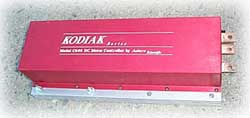

|
|
Electric Vehicles
An electric vehicle is one that is powered exclusively by electricity, and carries with it it's own
source of power. The most common way to accomplish this is by storing the electricity in a bank of
 batteries. The electricity stored in the batteries power an electric motor, which is coupled to the
wheels. Some electric cars are purpose-built, built from the ground up with the intention of being
powered by electricity. Others are conversions, a common production-line vehicle that has been
modified by replacing the motor and adding storage areas for batteries.
Technological advancements have led to more and more versatility in electric vehicles. It is possible
to build an electric vehicle that will easily outperform conventionally powered counterparts, but the
batteries. The electricity stored in the batteries power an electric motor, which is coupled to the
wheels. Some electric cars are purpose-built, built from the ground up with the intention of being
powered by electricity. Others are conversions, a common production-line vehicle that has been
modified by replacing the motor and adding storage areas for batteries.
Technological advancements have led to more and more versatility in electric vehicles. It is possible
to build an electric vehicle that will easily outperform conventionally powered counterparts, but the
 cost effectiveness of these vehicles can still stand some improvement. Batteries with a given
electrical capacity are constantly becoming cheaper and lighter, as are motors- but the real magic is
in a device called the controller, which is responsible for regulating the amount of power to the motor
from the batteries. The controller must be able to throttle the immense amount power without losing it
in the form of heat, or failing. Controller technology is probably the most important and cutting edge
area of development in electric vehicles
Another area of development concerns electric vehicles that "manufacture" their own electricity
on-the-fly, using fuel cell technology. These vehicles most often convert hydrogen gas into electricity
by means of a reaction on an atomic level, and a wider range of fuels are becoming possible due to
recent developments (such as LP gas). The by-products of these reactions consist primarily of extremely
inert substances, such as water.
cost effectiveness of these vehicles can still stand some improvement. Batteries with a given
electrical capacity are constantly becoming cheaper and lighter, as are motors- but the real magic is
in a device called the controller, which is responsible for regulating the amount of power to the motor
from the batteries. The controller must be able to throttle the immense amount power without losing it
in the form of heat, or failing. Controller technology is probably the most important and cutting edge
area of development in electric vehicles
Another area of development concerns electric vehicles that "manufacture" their own electricity
on-the-fly, using fuel cell technology. These vehicles most often convert hydrogen gas into electricity
by means of a reaction on an atomic level, and a wider range of fuels are becoming possible due to
recent developments (such as LP gas). The by-products of these reactions consist primarily of extremely
inert substances, such as water.
|
||||||||
|
Copyright 2001 - 2002 NFA Technologies Last modified December 19, 2001 Email the webmaster |
|||||||||